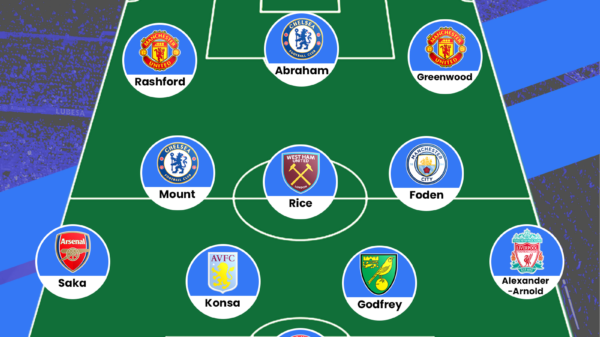Over the next few weeks and months, you will see a lot of statistics related articles on here, catering to that part of our readership that loves the utilisation of numbers and data in the beautiful game. This piece by Vishal Patel looks at Chelsea’s decision to let their young star Romelu Lukaku join Everton, and compares him to the leader of their attack, Diego Costa.
A few years ago, a young striker was creating waves around Europe, and was quickly labelled ‘The New Drogba’ by plenty of people. With pace, and power, Romelu Lukaku certainly bore the physical resemblance. His healthy goal scoring averages for club and country only added to the aura he had built up, and a mad race began, as Europe’s top clubs all wanted to snap him up. Eventually, Lukaku signed for Chelsea, a team he supported growing up, and earned the chance to train and play with his hero, Didier Drogba. He was the new leader of a new Chelsea attack that was going to change its ethos and style under the talented, and watchful eye of Andres Villas Boas.

Perfect fairytale, right? Only it didn’t end happily ever after for all involved. Villas Boas was sacked less than a year later, Drogba left too after leading his club to the Champions League, and Lukaku didn’t even get a chance to impress. A couple of very impressive loan spells at ‘lesser’ clubs led to a clamour among keyboard warriors to give the boy his shot at the big time in the Blue of Chelsea, but Jose Mourinho and the hierarchy decided otherwise, letting him sign for Everton instead, for an eye popping fee of course.
In his stead, the new leader of the Chelsea attack, is one Diego Costa. The Brazilian, who plays his international football for Spain, decided to come to Chelsea on the back of a breathtaking season at club level, which saw his unfancied Atletico side win La Liga, and reach the Champions League final only to be denied by a few seconds. The star signing is under huge pressure to deliver, with only an ageing Drogba, and Fernando Torres to back him up as of now. So was it a smart move on the part of Jose to let Lukaku go for Costa? Let’s look at what the numbers have to say.

Romelu Lukaku at Everton in 2013-14 | Stats via squawka.com
Of course, it’s important to remember that plain numbers make no sense. These have to be taken in context for them to lead us to any meaningful conclusions at all. It’s fairly safe to assume that both Costa and Lukaku are target men strikers, and both of them would’ve been/will be used as such by Jose Mourinho. Essentially, what Mourinho is looking for, is a penalty box presence, who can bring team-mates into play, and score around 20 a season himself. Having established this, we can take a look at the numbers, and try to interpret them.
In terms of how much they help their team mates in the attacking third, the picture is a bit unclear. While Lukaku has more assists, with 6 to Costa’s 3, Diego Costa has created many more chances, 45 as against 32 from the Belgian to be precise. In a per game scenario, that translates to 1.29 chances created by Costa, as opposed to 1.07 by Lukaku. Taken into context, this (the fact that Lukaku has more assists, despite creating fewer chances) isn’t because Costa had less quality around him (David Villa was his partner, remember), it’s because he only had 1 player close to him most of the time. Lukaku had 3 players constantly running off him, playing around him, and receiving passes from him to try and score. While Costa’s role at Atletico was centered around scoring, Lukaku’s expected more out of him in terms of liaising with his team mates. Indeed, this tactical reason aside, one might even say that Lukaku did a better job combining with his peers, as a lot of these extra chances created by Costa may have come in the 500 extra minutes that Costa played over the course of the season.
Now we come to the big daddy, goals scored. While Lukaku managed a fairly impressive 15 in 30 appearances for Everton, Diego Costa scored 27 times in La Liga. Again, due to differences in the number of minutes these 2 strikers saw, it makes sense to employ a per game number, and that leaves Lukaku with an average of 0.5 a game, while Costa is well ahead on this front, with 0.77. Many will point, correctly, to the fact that La Liga doesn’t really boast of too many tough defenders, especially when compared to the Premier League. Another point that has to be made is that Costa is a player who looks to bully his opponents, and doing so will be much tougher in the Premier League, where his physical gifts will not set him as far apart as they did in La Liga, with all due respect.
In terms of how these goals were scored, pure numbers wont really do justice, and so percentages have been taken into account. Lukaku has scored 33% with his right foot, and 47% with his left foot, and the rest with his head, which is a fairly even spread, and one that’s pretty desirable. For Costa, 89% of his goals have come from his feet, in words, 25 were scored with his feet. Of this, 14 came from his right foot, and 11 from his left, which is, again, a fairly even spread. Both of these players are pretty adept in front of goal, and are quite capable of getting it in using any means necessary, especially in the penalty box. Except for one goal, which came from outside the box, all of Costa’s goals were inside the box. All of Lukaku’s 15 strikes were also from inside the box. Mourinho spoke about wanting a striker who could make a difference in this part of the field, and both Costa and Lukaku offer him an option here. What may worry Chelsea fans is the fact that Costa has scored only 2 headed goals, and you might want a better return than that from a target man playing in Spain. Lukaku is ahead of Costa when it comes to shot accuracy, with his 63% beating Costa’s 57%.

Diego Costa at Atletico in 2013-14 | Stats via squawka.com
Coming to individual battles, Lukaku seems to be way ahead of Costa. In terms of take ons, Lukaku enjoys a 48% success rate, compared to 36% for Costa. While Lukaku takes the cake in terms of percentages, in absolute terms, Costa is ahead, executing 1.71 successful take ons per game, compare to 1.33 from Lukaku. What’s surprising is the fact that Lukaku is far far ahead of the ex-Atletico man in terms of aerial duels. Lukaku’s 38% dwarfs Costa’s 21%. And Lukaku achieved this in the Premier League, not La Liga. Even in absolute terms, Lukaku does very well, with 3 aerial duels won per game, while Costa scores a meagre 1.03 on this count. 1 aerial duel per game, at a 21% success rate is not really what you look for in a target man worth his salt.
The next stat though, is where it gets interesting. As far as fouls won are concerned, Lukaku has 12 in 30 appearances for Everton, while Costa has a whopping 112! Lukaku’s 0.40 per game on this front looks quite tiny compared to the 3.31 per game that Costa draws. This was crucial for Atletico, and could be crucial for Chelsea as well, considering the kind of height and aerial prowess both teams have. It’s an ability that fitted well in Simeone’s strategy, with Atletico targeting set pieces as opportunities to score goals.
Essentially, Diego Costa is a player who revels at drawing the mistakes from the opposition. This is important, as it could be the difference maker. Costa is a player who will always provoke opponents, fight with them, get in their faces, elbow their ribs and so on. Often, it’s these little things that make a difference as a striker.
This also reflects the mentality. Jose Mourinho has always maintained that he had a problem with Lukaku’s attitude, specifically the Belgian’s reluctance to stay at Chelsea and fight for his place in the first team. Costa on the other hand is a player with the kind of fighting attitude that Mourinho seems to build his teams on. It may not seem relevant, but character is in fact, one of the key components of any squad. This is probably where Lukaku lost out to Costa, despite being as good, if not better than him, in terms of pure numbers. At the same time, we cannot ignore the kind of stats that Lukaku boasts of. Over the last few years, Everton have been trying hard to break into the top 4 and breathe the rarefied air of the Champions League, and this is a signing that could take them to that next level, as he is certainly more potent than a lot of other strikers in the Premier League at the moment, and quite possibly has his best years ahead of him.
What are your thoughts? Will this move prove to be regrettable to Chelsea? Or is their present squad more than adept at success, at least in the short-term?
- Analysis: Are Chelsea’s pressing issues a concern? - October 5, 2020
- Has Financial Fair Play Been Worth It? - August 27, 2020
- Tactical Philosophy: Frank Lampard - May 20, 2020

























































